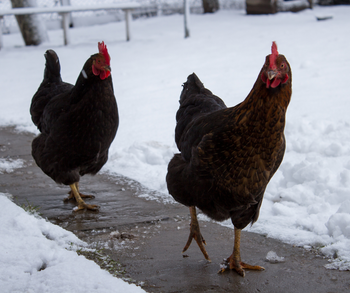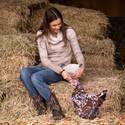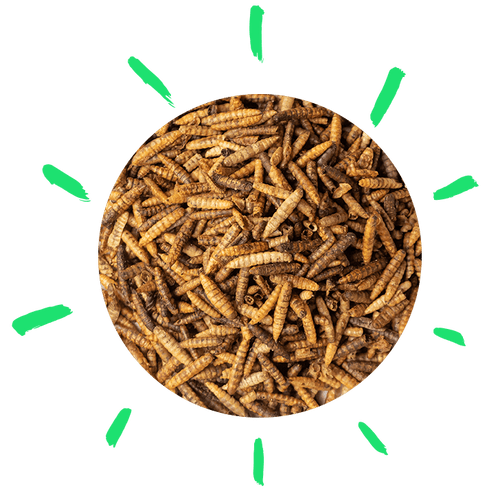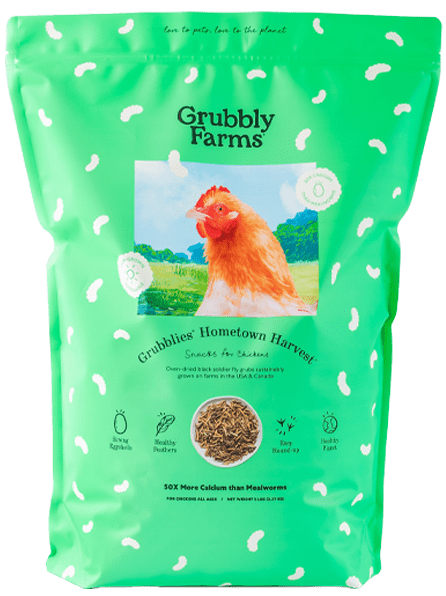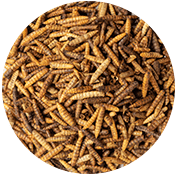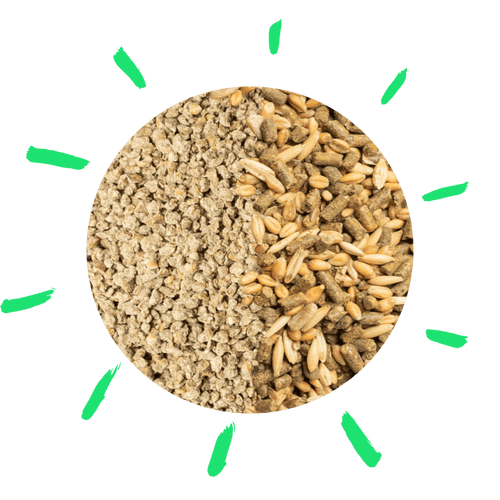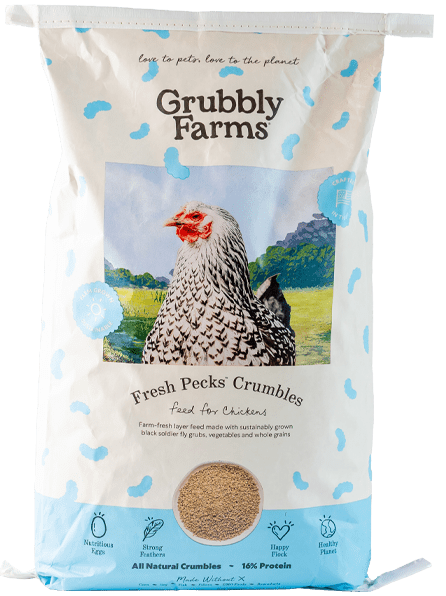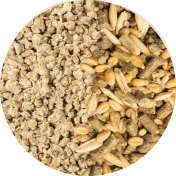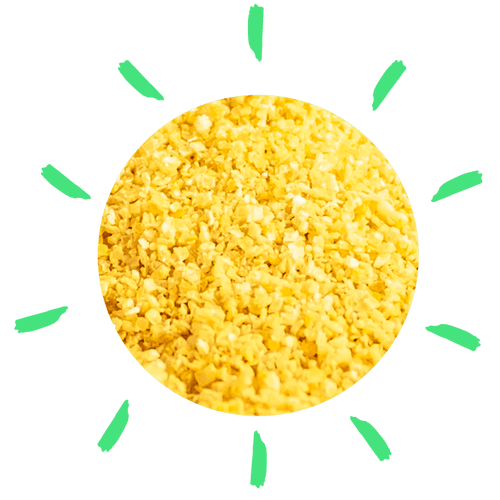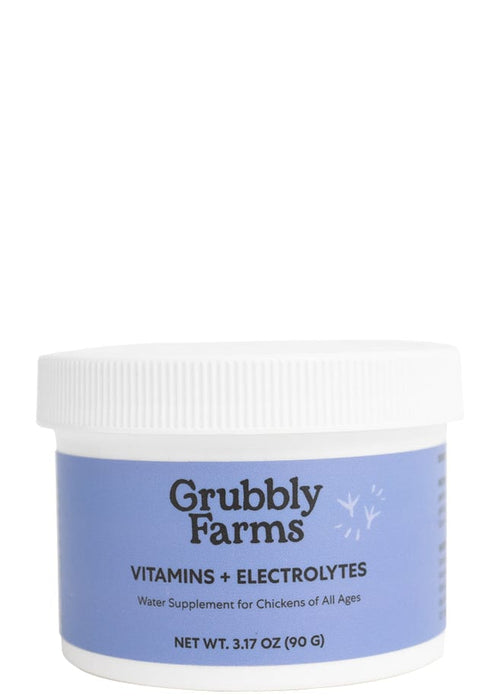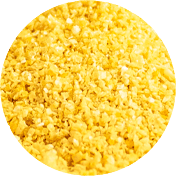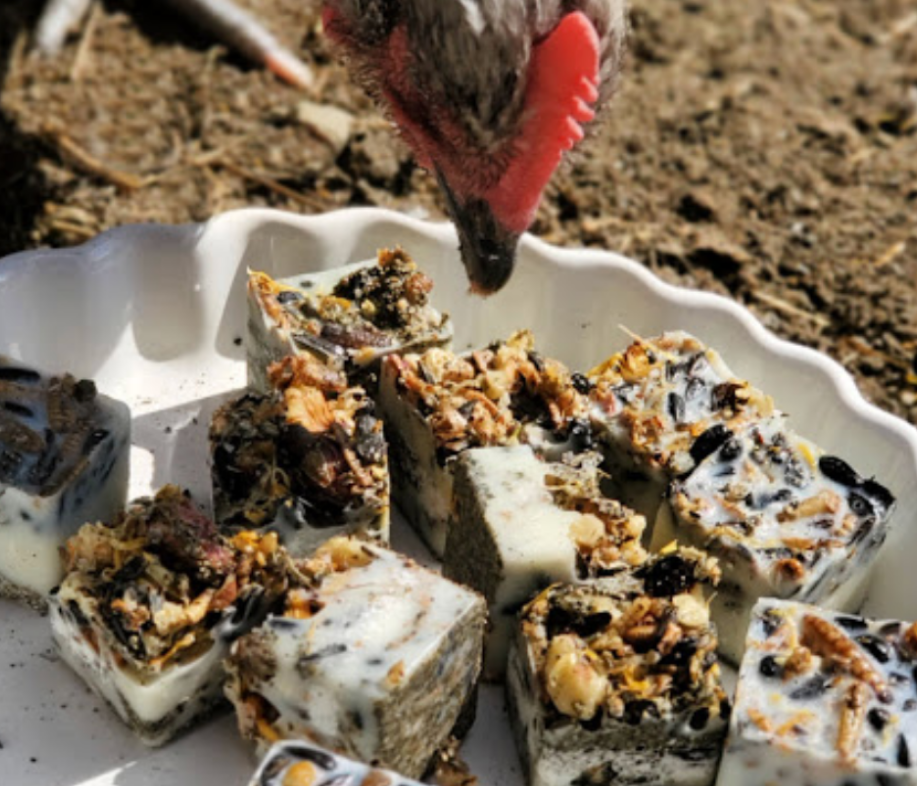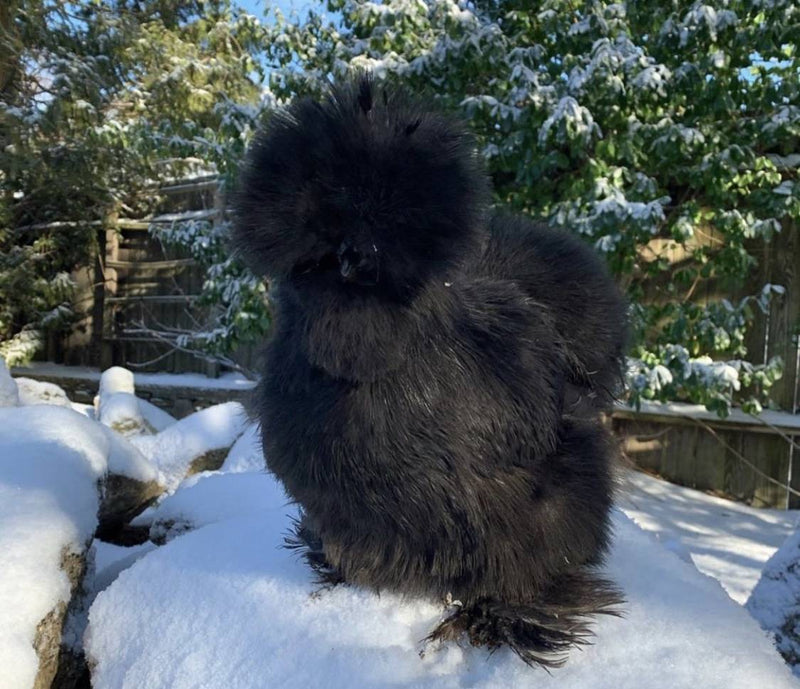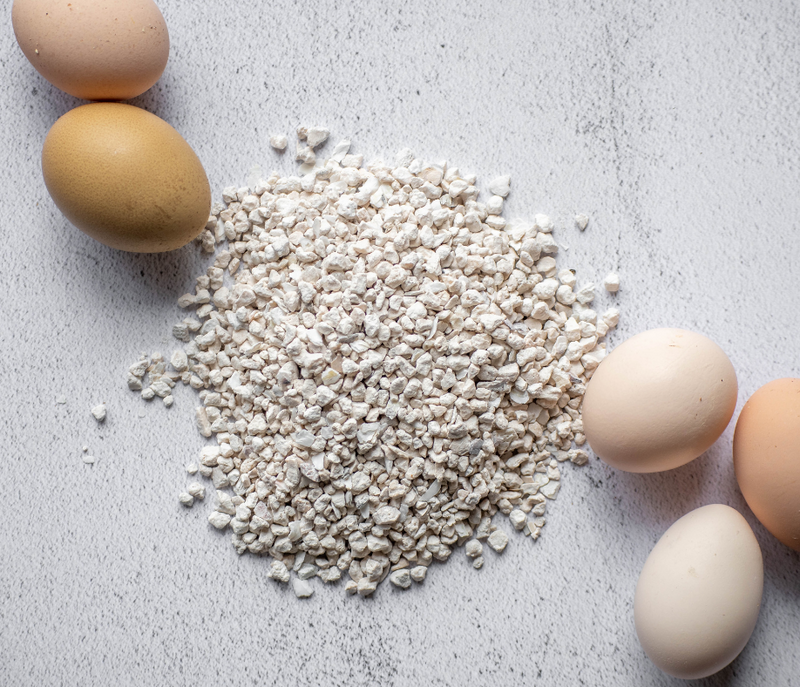The change in weather means it's time for a change in diet for your flock. Switching up your flock's feed can make a world of difference for their health and comfort through the cold weather. Unsure what your flock needs as the temperatures drop? This article will help you understand your chickens' wintertime nutritional needs and how you can provide them a winter health boost.
Why Chickens Need a Different Diet in Winter
The colder weather causes different dietary needs and the lack of natural variety in the diet calls for some special dietary additions.
Changing up your flock’s winter diet can help them
- Stay warm
- Get the nutrition they need
- Stay healthy
While there are some great natural additions to incorporate into their winter diet, you should also pay attention to what your flock is getting as their base ration. These guidelines will help you feed your flock a seasonal-based diet that ensures they stay happy, healthy, and well-fed this winter!
A Natural Diet for Chickens

A chicken’s ancestors, the red jungle fowl, fed on grains, seeds, leafy greens, and bugs all year round. This kind of diet would also be natural for our domestic chickens. They do not naturally want to eat a completely grain and plant-based diet. They want insects too!
During the winter, backyard flocks tend to get a more limited diet or get offered an imbalanced diet. Seeds and grains become a predominant part of their diet and usually fats and carbohydrates get increased in disproportion to the rest of the diet as well. That is why changing your flock over to a balanced, natural winter diet is important!
A natural diet for chickens consists of some seeds and grains, but it also includes meat-based proteins, like bugs, as well as leafy greens and other produce. During the winter, you should be mindful of adding these elements into your flock’s diet through supplemental snacks like Grubblies.
Let Your Flock Free-Range
During the months when we have nice weather, we can let our flocks free-range or supplement their diet with fresh produce, garden scraps, and other in-season foods.
The Daily Ration
The foundation of your flock’s winter diet should be a complete poultry ration. The most common ration for backyard flocks is a layer feed. Layer feed contains all the essential nutrients to keep a laying hen healthy and productive. This does not mean that all layer feeds are created equally. The quality of the ingredients, the amount of processing, and the source of the ingredients all play a role in how nutrient dense the feed is.
For a natural diet, you will want to choose a natural daily ration or layer feed.
What Is a Natural Poultry Ration?
Poultry rations come in several different varieties, the most common being pellets, mash, and whole grains. The most natural ration for chickens is the whole grain ration, with the second most natural being the mash rations. Whole grain (or pellet/whole grain) and mash rations allow the chickens to customize their diet based on their individual needs.
A chicken's individual dietary needs will be influenced by
- age
- breed
- genetics
- external factors like consuming extra treats and changing weather conditions
Since each ingredient in the whole grain ration or mash ration contains different dietary elements, the chicken can choose what ingredients they need more of at the time.
Added Benefits of Whole Grain Feeds & Mash
Another benefit to mash and whole grain feed during the winter is that the feed ingredients create more internal heat when they are digested. Since whole grains are completely whole and have not been processed, their digestive retention time is longer. This allows more internal heat to be generated as the digestive system breaks down the grains.
Mash and whole grain feed is also more entertaining for your flock, which helps prevent boredom during the winter.
What If Your Chickens Pick Out Their Whole Grain Faves?
If the whole grain or mash feed is introduced correctly, your flock will not pick out certain ingredients and leave others. They may eat certain ingredients first, and then consume the other ingredients later. That is why free-choice feeding is important during the winter too. It allows your flock to continually refuel their energy reserves throughout the day as they consume their daily feed.
Pellets + Whole Grains
A pellet and whole grain combo feed is also a great choice. The chickens can still customize their diet by consuming certain whole grains, but when they consume the pellets, they are still getting the essential nutrition that they need on a daily basis. Grubbly Fresh Pecks is a great option for the daily ration in your flock’s winter diet since it's a combination of whole grains and pellets. It is also an insect-based poultry feed. Rather than using fish or soy, Grubbly Fresh Pecks contains both insect and plant protein, inspired by a chicken's natural diet.
Extra Protein

One element in your flock’s diet that should be increased during the winter is protein. Protein is an extremely important element in a chicken’s diet.
When it comes to your chickens' daily diet, protein:
- maintains healthy body functions
- creates antibodies to fight disease
- is continually being used up by the body & needs to be replenished
Why Add More Protein to Your Chickens' Winter Diet
Protein for chickens in winter is especially important because during the winter, a chicken uses even more protein as it deals with factors like cold stress and the increased need to stay warm. Increasing the protein content in your flock’s winter diet will ensure they are getting the protein they need to stay warm and keep functioning.
Avoid Adding Excess Carbs to Your Gals' Diet
While it may be tempting to increase the carbohydrates or fats in your flock’s diet, (think scratch grains and extra seeds and grains), it is actually more beneficial if you focus on providing additional protein sources. Your flock will already be getting all the carbohydrates they need in their daily ration.
Carbohydrates are also the first thing that the body burns for energy and they are used up very fast. This is great for instant energy, but for long term energy needs, like staying warm all day, carbohydrates will not be helpful.
Fat Fact: Fats Aid in Winter Energy Utilization
Fat on the other hand, does increase the digestive retention time of feed ingredients and provides twice as much energy. However, fat is not an essential component in the poultry diet and should not be increased in substantial amounts. Sources of high protein naturally contain some fat as well, so if you focus on increasing the protein in your flock’s diet, the benefits of fat as an energy source will also be supplied in moderate amounts. Also, when protein is digested it produces internal heat, whereas fat does not. The internal heat can be used as energy to help the chicken stay warm.

How to Safely & Easily Increase Your Flock's Protein in Winter
When increasing the protein content in your flock’s winter diet, focus on high-quality, natural protein sources. Incorporate in both plant-based and bus-based protein sources since they both provide added nutrition to the diet. Extra protein sources should be considered supplements or treats/healthy snacks - they should not be a substantial part of your flock’s daily feed intake. Remember, your flock’s daily feed ration is still the most important part of their winter diet!
Here are some great supplemental protein sources you can offer your flock this winter:
- Canned sardines (Note: Some say this can affect the taste of your eggs)
- Sprouted lentils
- Meat scraps - cooked beef, pork, lamb, seafood
- Eggs
- Black soldier fly grubs - Chickens, ducks, and other birds naturally love insects, so this is one of the most popular forms of protein for your flock.
Switching Your Chickens to a Higher Protein Diet for Winter
Another way to increase the protein levels in your flock’s winter diet is to switch them over to a higher protein daily ration. Gamebird, showbird, and starter/grower feeds often contain more protein than layer feeds. Many people also switch their flocks to a starter grower feed high in protein, such as Little Pecks.
The Quality of the Protein Matters
One thing to keep in mind when choosing your chickens' winter diet is that the protein source makes a difference. You want to choose a protein source with amino acids that support healthy feathers for better insultation and bolster your gals' immune systems. Grubby Fresh Pecks is naturally higher in healthy protein thanks to the black soldier fly larvae that it contains.
If you do switch your feeds, make sure you do so gradually so that you don’t cause any digestive upset, and be sure to take the additional protein from the feed into consideration when supplying high protein treats and supplements as well. Too much protein can cause health issues too. You can learn feeding tips here to gradually introduce your flock to a new feed.
Natural Supplements During Winter
Supplements can also be incorporated into your flock’s winter diet. Winter supplements can be used to help prevent or treat specific issues that may be present during the winter. Supplements should be used with a specific reason in mind and a full understanding of what benefit the supplement will provide for your flock.
The best winter natural supplements to focus on are ones that
- stimulate circulation
- boost the immune system
- enhance the digestive functions
Here are some healthy winter supplements to add to your flock’s diet:
- Vitamin supplement - general vitamin supplement
- Ground ginger- circulation stimulator
- Ground turmeric- immune booster
- Cooked elderberries- immune booster, respiratory aid
- Crushed garlic- immune booster, promotes overall good health
- Ground cinnamon- immune booster, digestive aid
- Apple cider vinegar- digestive aid
- Probiotics- digestive aid
Circulation Supplements
Cold weather will suppress circulation in a chicken’s body. Supplements that stimulate circulation will help prevent frostbite and ensure proper blood flow throughout the chicken’s body. The immune system is also usually suppressed during the winter as well. Energy sources will be put towards staying warm instead of being used to build up antibodies against disease and illness.
Immune Support Supplements
Supplements that boost the immune system will help your flock ward off disease, parasites, and illness. Lastly, the digestive system is often taxed and sometimes compromised during the winter. Supplements that aid with digestion will help your flock get the maximum nutrition from what they eat which will also provide more energy to help them stay warm.
Occasional Supplements
Supplements that address specific issues should be offered during the time of need. For example, if it is extremely cold out, circulation will be reduced so you should provide circulation stimulating supplements during that time.
Other supplements that promote overall good health or help prevent winter time issues should only be offered on occasion, such as once a week. Layer Calcium will ensure calcium needs are met, while crushed garlic is a great supplement to offer for additional immune support. Probiotics are best offered when your flock may be experiencing some cold stress. Ground ginger is great to sprinkle on warm feed or treats to stimulate circulation on cold days. Apple cider vinegar helps the digestive system metabolize grains better, so it is helpful when your flock is consuming a mostly grain-based diet.

The Right Treats & Scraps
The best treats and scraps you can give your flock during the winter are leafy greens and other vegetables, fruits, and berries. These will complement your flock’s natural diet very nicely and would mimic what they could free-range for during the summer months.
Dried bugs, such as black soldier fly grubs, are another excellent winter snack. The bugs provide a great source of additional protein as well as contain good amounts of other nutrients to compliment the diet.
Treats & Hand-Outs to Avoid
Treats and food scraps that should be avoided during the winter include foods that are grain-based, high in carbohydrates, and contain mostly fat. The flock’s daily ration is already providing them with grains and carbohydrates, so adding more of those dietary elements into your flock’s diet could cause them to consume an imbalanced diet which can lead to health issues.
Large amounts of fat should also be avoided. While fat does provide a lot of energy for staying warm, it can also be fed in excess way too easily. So it is best to just stick to the treats and scraps that you know will benefit your flock.

Aim for Moderation & Variety
One thing to keep in mind when adding snacks and food scraps to your flock’s winter diet is to offer foods in moderation and keep it varied. If you have a lot of one treat or food scrap, save some for later so that you don’t give your flock too much of it all at once. Variety is the key! Your flock will love being surprised with different snacks each week.
Snack-o-Clock: Timing Matters
Another good thing to do is to feed your flock the snacks and food scraps in the afternoon or evening. This allows them to eat plenty of their daily ration in the morning, then top things off with the special treat or snack in the afternoon. Leafy greens, fruits, and vegetables are excellent boredom busters for the afternoon. High protein treats are great to offer right before roosting time since they will provide energy all night long for staying warm.
Here are a list of healthy snacks and scraps that you should give your flock during the winter:
- Leafy greens- lettuce, spinach, swiss chard, bok choy, kale
- Vegetables- cabbage, carrot peelings, broccoli, cucumber
- Winter squash- pumpkin, buttercup squash, acorn squash
- Berries- blueberries, blackberries, cranberries
- Fruits- apples, pears
- Protein- bugs, meat scraps, eggs (See the difference between mealworms and black soldier fly grubs here)
Winter Diet = Healthier, Happier Hens!

A winter time diet for your flock will help them stay healthy and warm all winter long. A complete, whole grain base ration should make the foundation of their winter time diet. Then, consider how you can increase the protein in their diet. Whether it's through a high protein feed or supplemental protein snacks, extra protein will provide your flock with energy for staying warm. Add in some natural supplements and some healthy treats and your backyard flock will appreciate their new winter diet!





